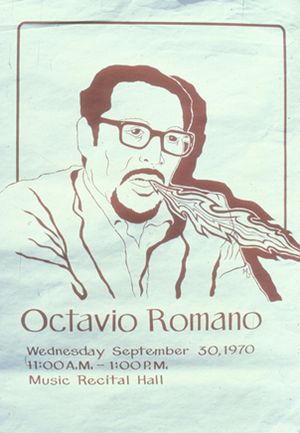Quinto Sol facts for kids
Quinto Sol was a special publishing company. It was the first independent publisher to come from the Chicano Movement in the 1960s. Editorial Quinto Sol, also known as Quinto Sol Publications, started in 1967. It was founded at UC Berkeley by Professor Octavio I. Romano. He worked with Nick C. Vaca and Andres Ybarra.
The name "Quinto Sol" means "Fifth Sun" in Spanish. This name comes from an Aztec myth about how the world was created and destroyed. Since the Chicano Movement began in the 1960s, this idea became a way for people to show their culture. The "Fifth Sun" was often used in Chicano music, art, and books.
The main goals of Quinto Sol were "cultural unity and self-determination". This means they wanted Chicano people to be proud of their culture and make their own choices. The publishing house, its writers, and their books were very important to the Chicano Movement in the 1970s. They wanted to create a fair place for Mexican American writers to share their ideas.
Contents
Publishing Chicano Voices
Starting in 1967, Quinto Sol published a journal called El Grito: A Journal of Contemporary Mexican-American Thought. This was the first national academic and literary journal ever published in the United States. The journal's name, "El Grito," means "the Shout" in Spanish. It aimed to help Chicano people across the country feel connected and proud.
El Grito was a place where Chicano scholars, writers, and artists could share their work. They used it to challenge negative ideas about Mexican Americans. These ideas were sometimes spread by scientists, other books, and the media. As the journal grew, it helped expand Chicano expression and self-definition.
The writers in El Grito pointed out unfair views about Mexican Americans in schools and studies. They tried to correct these misunderstandings. Quinto Sol also released Voices: Readings from El Grito: A Journal of Contemporary Mexican-American Thought. This book was a collection of the most important works from the journal. A second, larger edition of Voices came out two years later. These texts became key resources for people learning about the new field of Chicano Studies.
In 1969, Quinto Sol published El espejo--The Mirror. This was the first collection of Mexican-American literature. The books published by Quinto Sol in the 1970s were often written in Spanish. Sometimes, they used both English and Spanish in the same text. The Chicano Movement and its works often drew ideas from Anglo-American culture, Mexican-American experiences, and Aztec mythology.
Quinto Sol played a big part in making Chicano literature a recognized type of writing. It gave Chicano writers a sense of belonging in the world of books. Quinto Sol helped many writers become famous, and their work is now considered classic Chicano literature.
The Premio Quinto Sol Award
The Premio Quinto Sol was a special literary prize created in 1970. It published the work of Chicano and Chicana writers from 1971 to 1975. This was the first national literary award for Mexican American authors. It aimed to recognize and support Chicano writers. The winner received $1000 and their book was published.
The first Premio Quinto Sol was given to Tomás Rivera in 1971. He was a professor of Spanish at Sam Houston University. He won for his novel ...y no se lo tragó la tierra (And the Earth Did Not Devour Him). Quinto Sol published it as a bilingual book, with Spanish and English versions side-by-side. Tomás Rivera worked closely with Quinto Sol editors after winning the award.
In 1972, Rudolfo Anaya won the second Premio Quinto Sol for his novel Bless Me, Ultima. Rolando Hinojosa won the third award in 1973 for Estampas del Valle y Otras Obras (Sketches of the Valley and Other Works). The Premio Quinto Sol was first awarded to a woman, Estela Portillo Trambley, in 1975. She won for her collection of short stories, Rain of Scorpions.
Lasting Impact
The books and journals published by Quinto Sol from 1967 to 1974 were very important. They are seen as some of the most influential works by Chicano authors. The literary award series, according to a note in Bless Me, Ultima, gave Chicano artists a way to express themselves. The writers whose work Quinto Sol published are now a key part of the Chicano literary and cultural movement.
Through El Grito journal, the Premio Quinto Sol award, and its other publications, Quinto Sol helped establish Chicano culture as a real field of study. It also helped create a list of important Chicano literature. It was a creative and intellectual space for people involved in "El Movimiento." Simply put, it was a necessary organization for Mexican American identity to grow. Thanks to Quinto Sol, Chicano authors and their supporters could create their own identity. This made it possible to build a self-defined Chicano community.
After seven years and four Premio Quinto Sol awards, the publishing house split. It became two separate publishers: Editorial Justa and Tonatiuh International. Tonatiuh International later became Tonatiuh-Quinto Sol (TQS) Publications.
Remembering Quinto Sol
In 2012, a group called "Quinto Sol Remembered" was founded at the University of California, Berkeley. Gustavo Buenrostro, Javier Huerta, Wanda Alarcón, Joseph Rios, and Patricia Velazquez started it. They wanted to honor the great literary achievements of Quinto Sol.
On April 6 and 7, 2012, a special meeting took place. Many Chicano writers and scholars attended to celebrate the Chicano publishing house. Important Chicano voices who participated included Alex Saragoza, Alurista, Edel Romay, Gustavo Segade, Hector Calderón, Juan Carrillo, Lorna Dee Cervantes, Lucha Corpi, Malaquías Montoya, Nick Vaca, Rosaura Sánchez, Rudy Anaya (who joined by video), and Sergio Elizondo.
 | Mary Eliza Mahoney |
 | Susie King Taylor |
 | Ida Gray |
 | Eliza Ann Grier |


